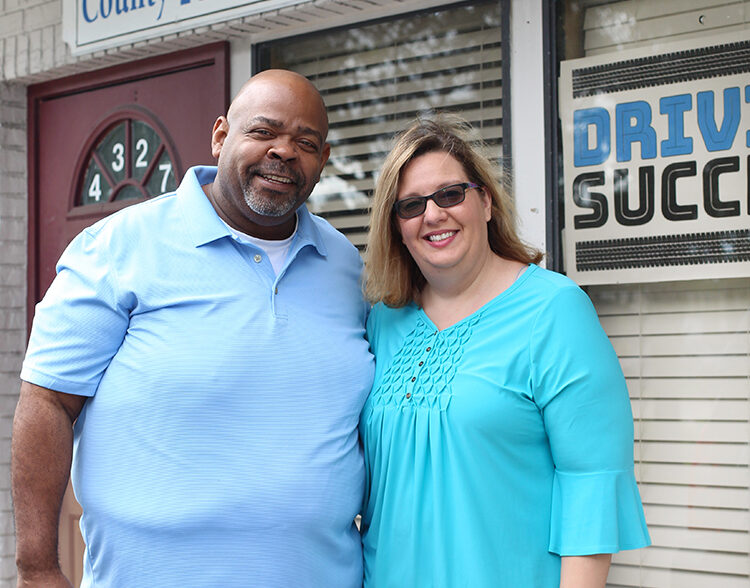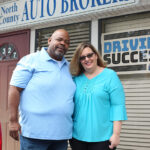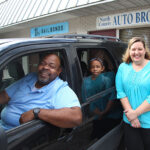
Recognizing that access to transportation is a major component on the road to economic self-sufficiency, Driving Success, a new nonprofit, is striving to put low-income, working families in the driver’s seat.
The organization was founded this past July by Michele and Kevin Peters, who have used her 20 years of experience as a development person in the nonprofit world and his expertise as a “car guy” with 30 years in the car dealer industry to develop a program that uniquely benefits both donors and car recipients.
In the summer of 2018, Kevin Peters opened North County Auto Brokers, a small dealership that buys cars at auction and has them repaired by mechanics. He tries to keep car prices under $5,000 to sell to lower-income people in the community.
Since then, they have seen increasing numbers of people without enough funds to purchase even low-cost cars. And, Michele Peters says, they didn’t have the heart to send them to “buy here/pay here” dealers, who offer financing at exorbitantly high interest rates.
“These poor people, who have no money and are desperate for a vehicle, are being charged interest rates that are just unaffordable,” says Peters. “I said to my husband, we need to do something. There are people here in the community that need help and there’s no program in this community like this.”
Having previously developed a vehicle donation program for another nonprofit, she knew that with standard programs, donated vehicles go straight to auction and the proceeds, minus what can be significant middleman charges, go to the nonprofit.
“But then I stumbled across a study that the Annie E. Casey Foundation did back in 2007, on vehicle donation programs like the one that I wanted to start,” says Peters.
She explains that because the mission of Driving Success is to provide cars to low-income families, donors are entitled to a tax credit based on the Kelly Blue Book, or fair market value, of the car, which is a higher tax credit than those sold just for proceeds.
She contacted several organizations with similar plans, including ones in Tampa and Baltimore that are going strong, and began looking at how best to serve our community.
“I started doing research locally and the Community Needs Assessment shows that there’s about 6 percent of households in Indian River County that don’t have a vehicle. That accounts for about 3,500 households that don’t have access to any vehicle; zero vehicles. It’s a huge need,” says Peters. “When you have no means of transportation, you’re stuck in a cycle of poverty.”
According to the Indian River Community Foundation’s Indian River Indicators resource, a walkability rate is based on a 1 to 20 scale, with 1 being the worst and 20 the best. Our rate is 7.4.
“But walkability access to transportation is a 1; so, it’s the worst. If you’re trying to walk to one of our buses, the stops are few and far between,” says Peters. Their hours of operation are also extremely limited.
“When you don’t have a car, what do you do?”
Without a car, she says, it’s difficult to get a job outside your walking distance, to access medical appointments, supermarkets, etc.
Several nonprofits, including United Against Poverty, Habitat for Humanity, Literacy Services, Homeless Children’s Foundation, Veterans Council and Youth Guidance, have already signed up as agency partners to refer clients needing a car. She has also reached out to Children’s Home Society and Hibiscus Children’s Center, “because there are a lot of kids that are aging out of foster care.”
Among the requirements, applicants must reside in the county, have a Florida driver’s license, be age 25, or 18 if they’re aging out of foster care or have dependent children of their own, and they cannot have any pending criminal charges, DUIs, or outstanding insurance or motor vehicle violations.
Their target audience has income levels between 150 percent and 250 percent of the federal poverty level. The rationale is that families with a higher income should be able to afford a car on their own, and lower-income families won’t be able to afford basic costs, such as gas, maintenance and insurance.
“We don’t want to put anybody backwards. We want the vehicle to move them forward, not make them have to decide whether to put gas in the car or feed the kids,” says Peters.
Applicants are also required to attend a budgeting workshop at United Against Poverty.
Their cars will come from auctions and donations from the public, whether the car is drivable or not. Cars will be taken to a mechanic for repairs or general maintenance, or will be sent to recycling, with any funds going back into the program to repair other vehicles. Higher-value vehicles would be sold, and the money used toward another four or five cars.
“I can turn that one car around to get multiple cars to serve the community. And they get a better tax value because they’re giving it to a nonprofit that is providing vehicles to the public,” Peters explains.
Clients are responsible for paying for car insurance and Department of Motor Vehicles fees for taxes and tags. Recipients will get the title after they pay a ‘pay-it-forward’ fee to the nonprofit of $500 for a sedan or $750 for an SUV or minivan, which can be reimbursed over 12 months.
“And then that money comes back to the nonprofit to help pay for somebody else’s car to get fixed,” says Peters. “I want them to put money into it so that they value the vehicle and are going to take care of it. I want people that really are going to use the vehicle to advance themselves economically.”
Peters says she is actively seeking donors and community partners, individuals and businesses that want to help support the mission.
“I have an auto mechanic that gives me a discount on his labor rate, and his parts at cost, and I’m looking to get other partners in the automotive industry that would be willing to donate some of their wholesale trading vehicles that they send to auction,” says Peters.
“If they would donate one car every three or four months, we would have a few cars throughout the year. I’ve also asked if I can buy their cars at a lower price before they send them to auction. I have not gotten a good response, which is really sad, but I’m not giving up.
Their salesmen don’t take no for an answer, and to keep going I’m going to keep asking.”
Although the nonprofit is too new to qualify for grants, she has spoken to people at United Way who recognize the need and are going to help by spreading the word.
“It’s an unserved population and there’s no service like this,” says Peters.
For more information, visit drivingsuccessirc.org.
Photos by Kaila Jones






